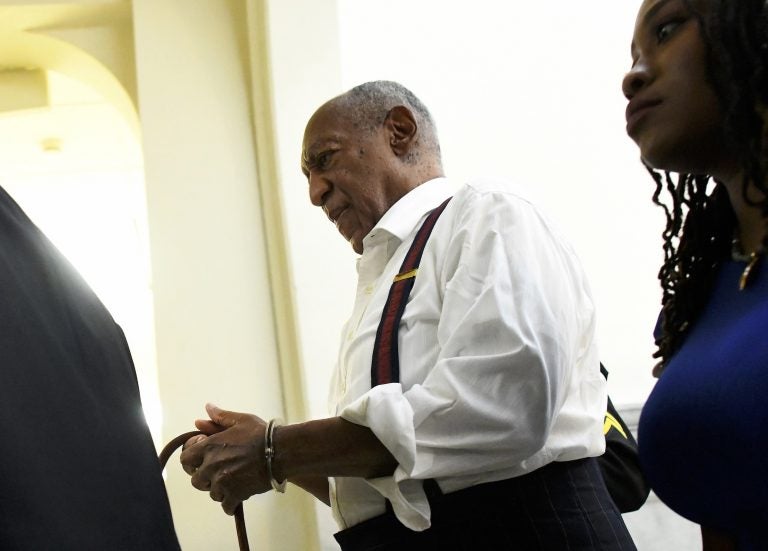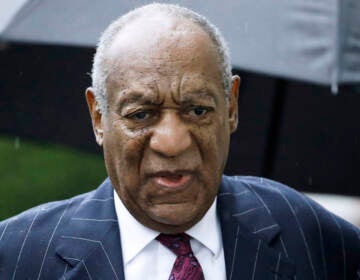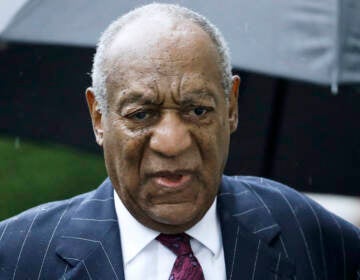Lessons from Cosby case should serve as a cautionary tale for all of us
The court is right, but Cosby’s accusers are understandably angry.

Bill Cosby is taken away in handcuffs after he was sentenced for felony sexual assault on Sept. 25, 2018, in Norristown, Pa. (Mark Makela/AP Photo)
Like everyone else, I was surprised that Bill Cosby’s sexual assault conviction was overturned by the Pennsylvania Supreme Court. It’s one thing for me to believe that Cosby was treated unfairly by a racist criminal justice system. It’s quite another thing for the state’s highest court to say Cosby’s due process rights were violated.
At issue was a promise by former Montgomery County DA Bruce Castor, who declined to prosecute Cosby in return for Cosby’s deposition in a civil case filed by Andrea Constand. She said Cosby drugged and sexually assaulted her in his Cheltenham home, and though Cosby didn’t face criminal charges at first, he paid her $3.38 million to settle the civil suit, and the deposition, which was supposed to be sealed, was ultimately used against Cosby at trial.
On Wednesday, Pennsylvania’s high court said that kind of prosecutorial bait-and-switch is wrong, writing that “the discretion vested in our commonwealth’s prosecutors, however vast, does not mean that its exercise is free of the constraints of due process. When an unconditional charging decision is made publicly and with the intent to induce action and reliance by the defendant, and when the defendant does so to his detriment (and in some instances upon the advice of counsel), denying the defendant the benefit of that decision is an affront to fundamental fairness, particularly when it results in a criminal prosecution that was foregone for more than a decade.”
The court is right, but Cosby’s accusers are understandably angry. They say Cosby drugged and sexually assaulted them, and Cosby says their contact was consensual. It’s hard to know who’s telling the truth in such cases, but the pursuit and conviction of Cosby seemed to be more about punishment than truth. It felt like the modern-day lynching of a Black man who dared to have sexual contact with white women.
This is not to say that Cosby is completely innocent. With 60 women accusing him of rape or sexual assault, it would be naïve to believe that. But in my view, this was about so much more than guilt or innocence. It was about making an example of someone. It was about giving voice to victims. It was about letting would-be rapists know that their crimes would not be tolerated.
Cosby was the perfect sacrificial lamb. At a time when sexual assault was at the center of the nation’s consciousness, his prosecution would become the signature achievement of the #MeToo movement against sexual abuse and harassment. He was a hero whose immoral behavior was laid bare for the world to see. He was someone who had risen to heights that most of us can only dream of. Most importantly, he was a Black man accused of drugging and sexually assaulting Constand and dozens of other mostly white women.
That last fact made it politically expedient for Kevin Steele to run for Montgomery County DA on a promise to prosecute Bill Cosby. Because, like it or not, the image of the sex-crazed Black brute is alive and well in America, and our country has a standard response to that racist trope.
According to the NAACP’s History of Lynching in America, “A common claim used to lynch Black men was perceived sexual transgressions against white women. Charges of rape were routinely fabricated. These allegations were used to enforce segregation and advance stereotypes of Black men as violent, hypersexual aggressors.”
Perhaps that’s why the Black community’s view of the case seemed to break along generational lines. Day after day, as I spoke with my radio audience, older Black people who could remember the days of lynching tended not to believe Cosby’s accusers. Younger Blacks were more likely to condemn him as a rapist.
Today, however, Cosby is free, and he can’t be tried again, so the lessons from his case should serve as a cautionary tale for all of us. Those who are accused of sexual assault should be tried in a court of law, but just like anyone else accused of a crime, they deserve due process. Accusers should be respected and heard. Prosecutors should honor their agreements. And everyone should get a fair shake, no matter the color of their skin.

Get daily updates from WHYY News!
WHYY is your source for fact-based, in-depth journalism and information. As a nonprofit organization, we rely on financial support from readers like you. Please give today.






